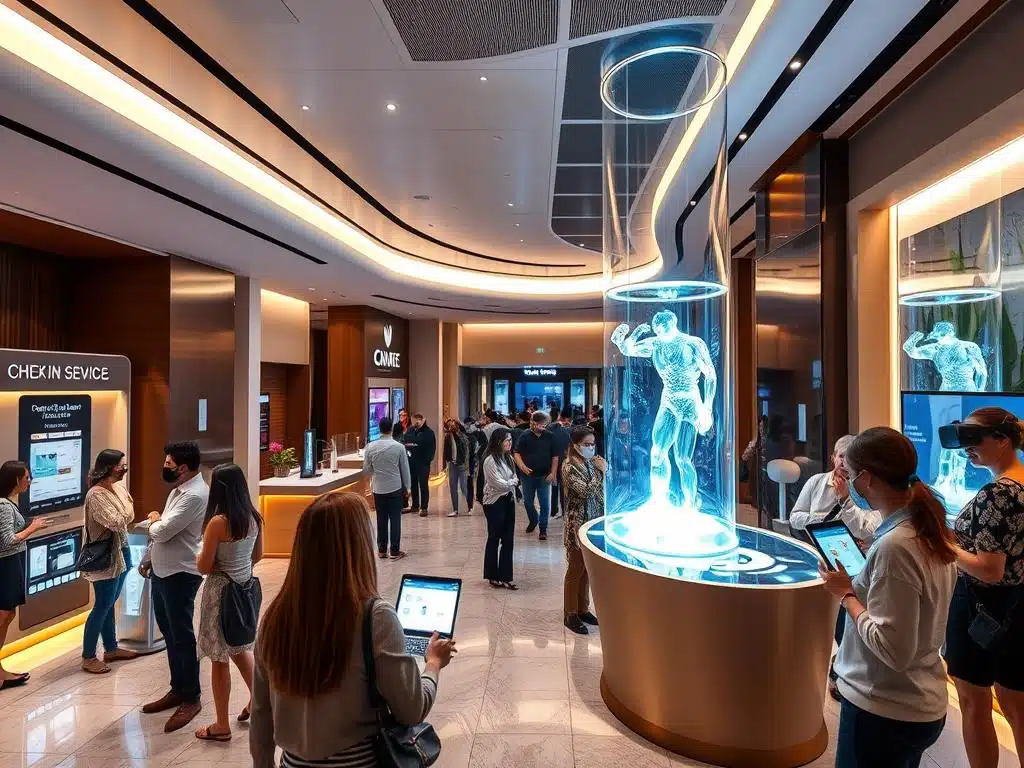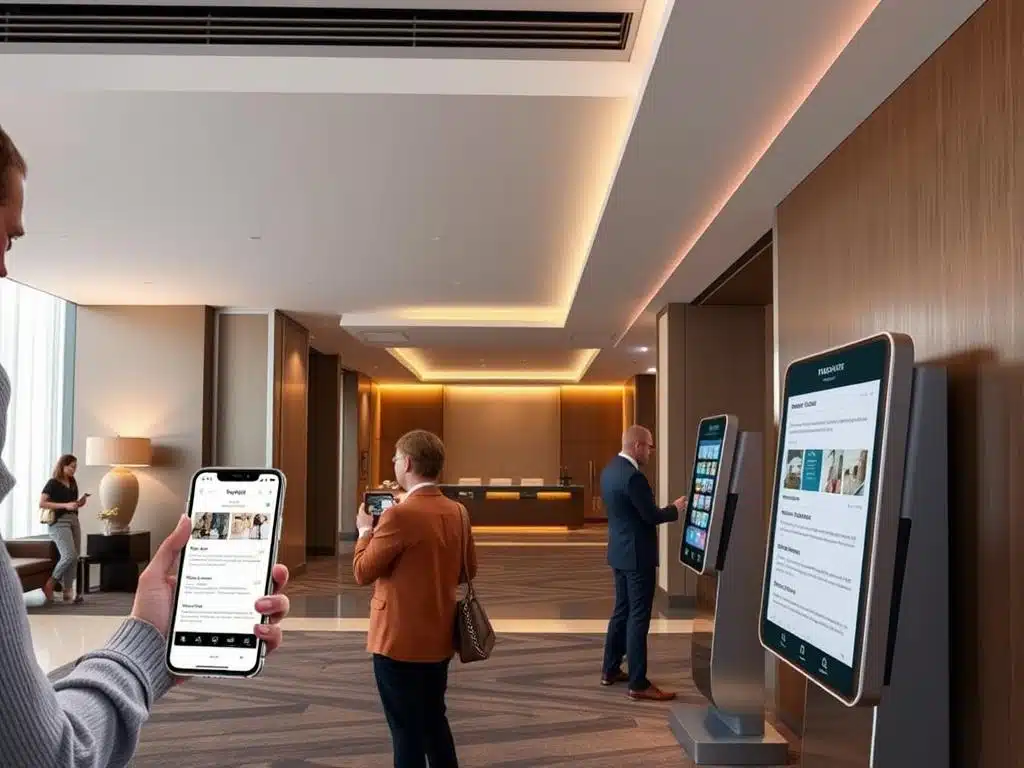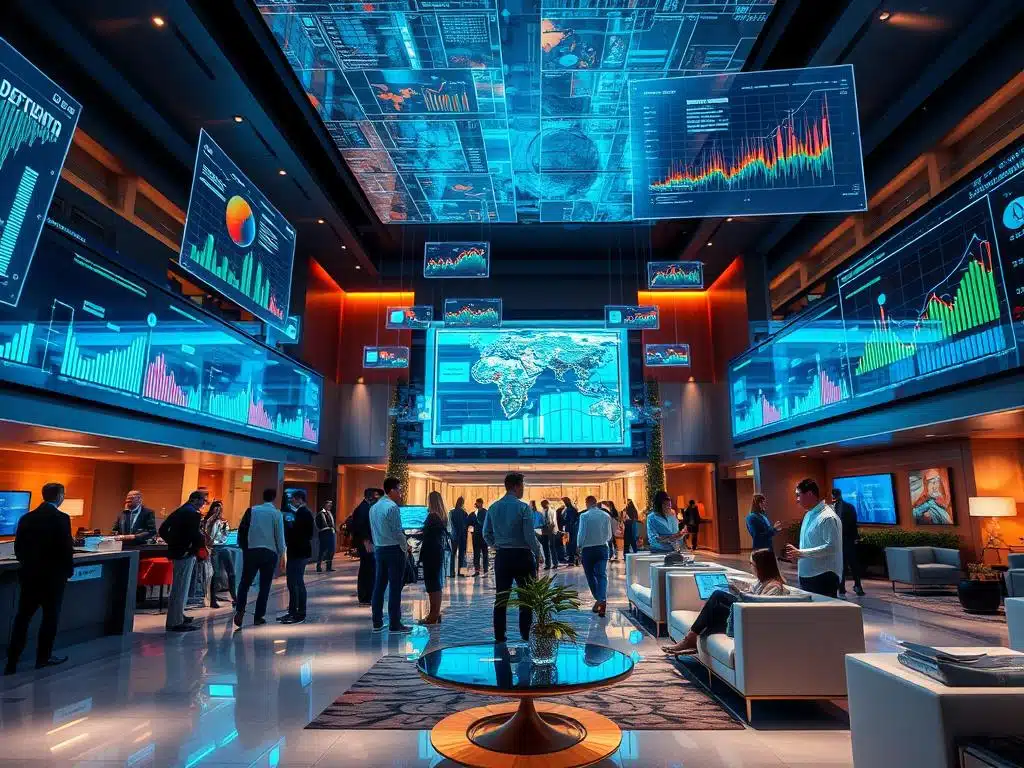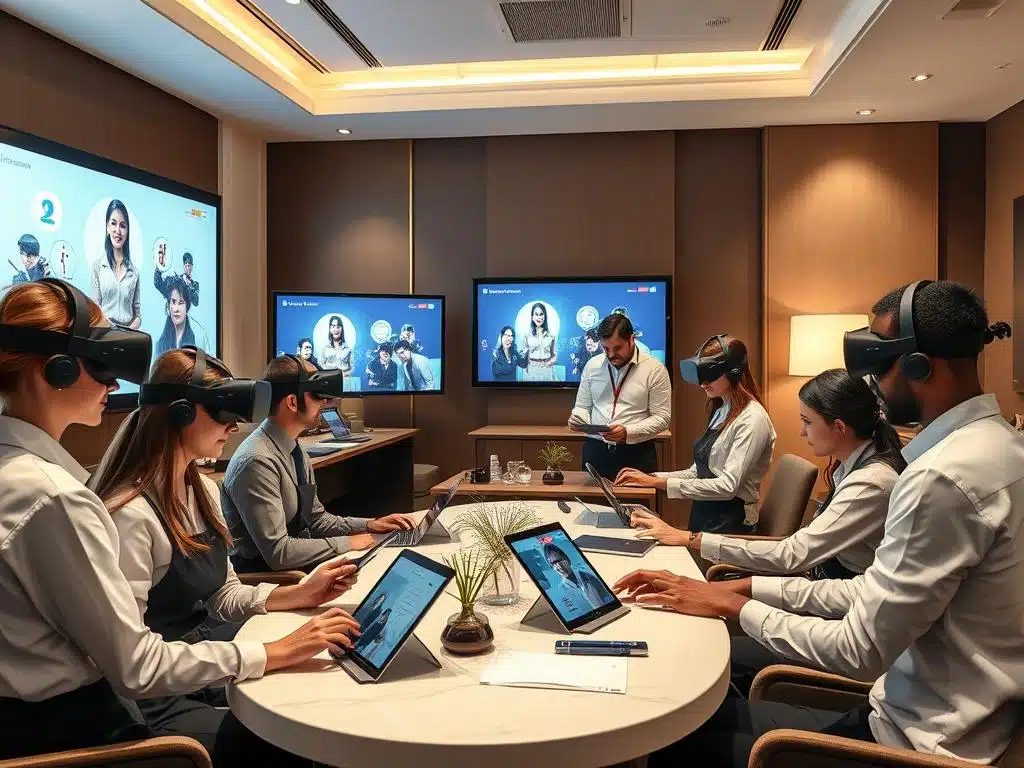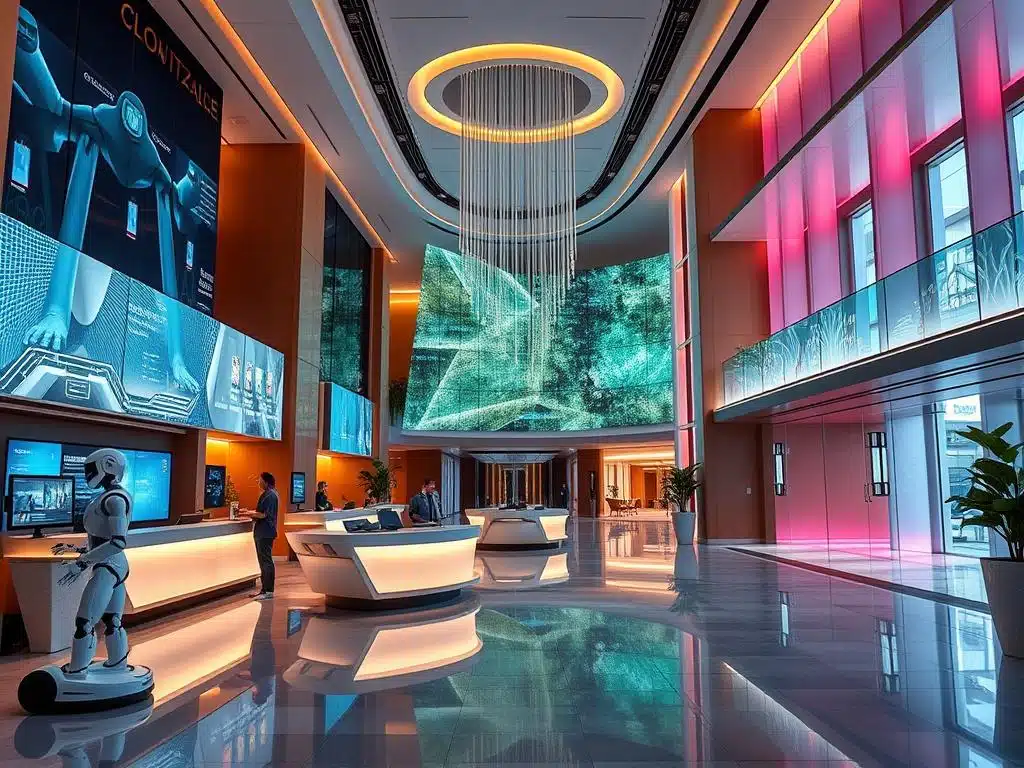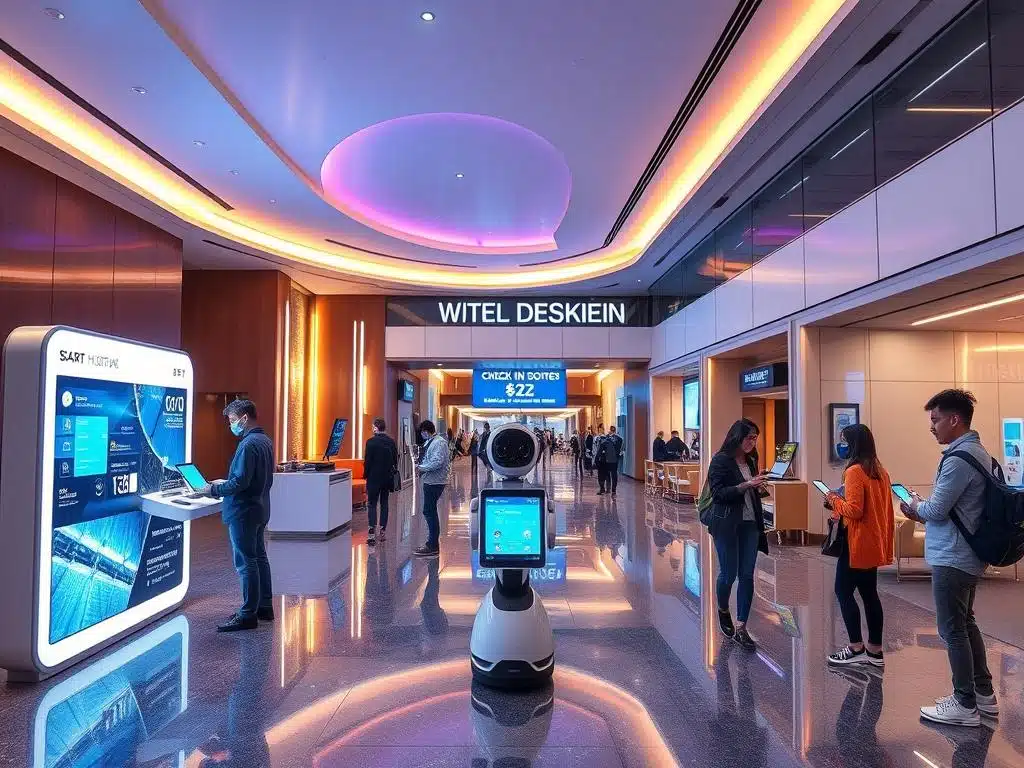We are entering a new era where customer-focused services are key. The hospitality industry innovation scene is changing drastically. The old ways are no longer enough. For significant growth, leveraging digital transformation strategies for hospitality is crucial, not just an option. By 2025, integrating advanced technologies will be essential for industry leaders. They aim to enhance the guest experience dramatically.
The journey towards this evolution starts with contactless services and personalized experiences as the new norm. Travelers’ expectations are reaching new heights, requiring hotels to adopt technologies like IoT, AI, and virtual reality. We aim to simplify these digital transformation strategies. We show how they can improve operations, sustainability, and, crucially, guest satisfaction.
Leading companies such as Marriott, Hilton, and Accor are spearheading this move towards digitalization. We provide expert insights into these developments. We help the hospitality industry flourish in the digital era. Sustainability isn’t just an addition to our strategy—it’s at its core. It guides businesses in their digital transformation while emphasizing environmental care.
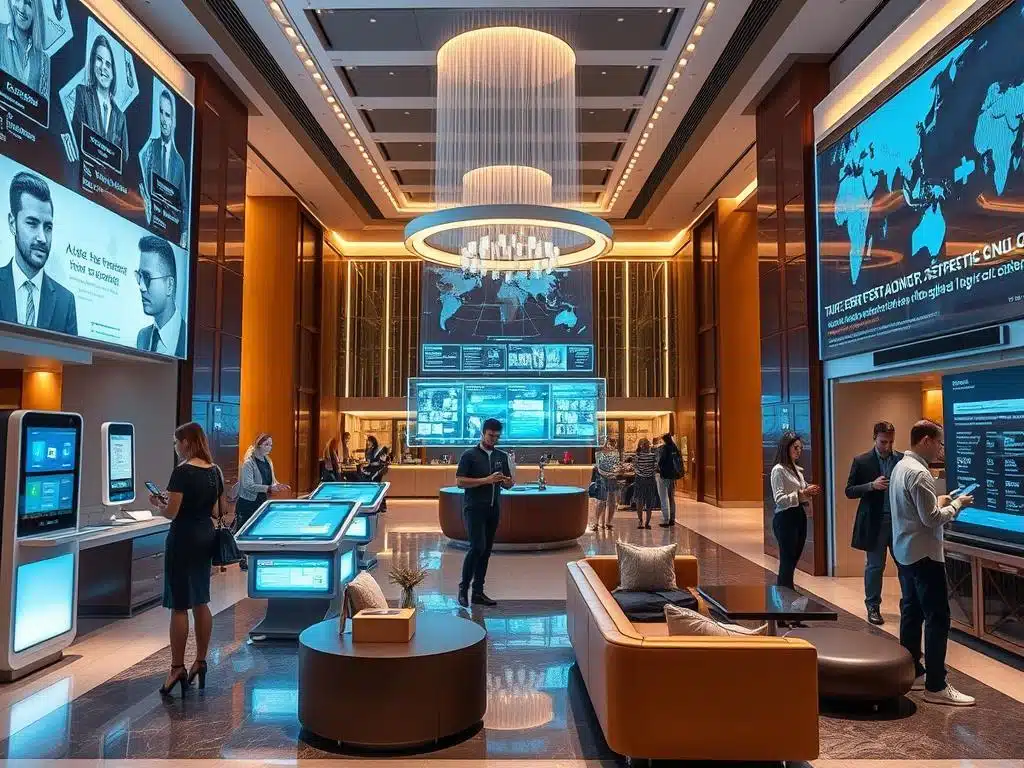
Key Takeaways
- Embracing the digital era is key to thriving in the hospitality sector by 2025.
- Innovative hotel technology trends are no longer optional but essential to meet evolving guest expectations.
- Implementing IoT, AI, and virtual reality is crucial for enhancing both guest experience and operational efficiency.
- Investing in sustainable practices is an integral part of successful digital transformation strategies for hospitality.
- Major hospitality players are setting the benchmark for digital innovation, and it’s imperative for others to follow suit.
- Balancing technology adoption with the human touch remains critical in delivering unparalleled guest experiences.
The Evolving Definition of Hospitality in the Digital Age
In the ever-evolving landscape of the digital age, the hospitality industry is excelling. It’s transforming service delivery through hospitality industry innovation. This revolution goes beyond technological enhancements. It’s about adopting a philosophy that prioritizes personalized and ethical guest engagement.
Enhancing the guest experience is central to this transformation. As digital solutions become integral, we focus on making these innovations intuitive and personalized. This era demands digital fluency. Hence, our commitment lies in using technology to elevate the guest experience enhancement. It’s about creating unforgettable experiences that deeply resonate with guests, shaped significantly by their preferences and insights.
To delve into the practical implications of these innovations, check out more information on digital transformation. It highlights forward-thinking strategies where technology enhances rather than replaces the human element. We believe in the power of authentic connections. Technology serves as a catalyst that enriches these interactions, preserving the essence of human warmth in hospitality.
The hospitality industry innovation has broader implications, visible in the sector’s growth. The industry hasn’t just bounced back to pre-pandemic figures. It has achieved new milestones in revenue and guest engagement, showcasing the successful marriage of innovation and daily operations.
| Year | Revenue Per Available Room (RevPAR) | Membership Engagement |
|---|---|---|
| 2021 | Surpasses 2019 Levels | Hilton Honors exceeds 60 million |
| 2022 | Continued Growth | Increased guest personalization |
| 2023 Projections | Steady Increase | Expanding digital engagement |
Looking ahead, the hospitality industry’s path is clear. It heads towards deeper, more meaningful digital engagements. The integration of hospitality industry innovation is foundational. It isn’t merely a trend. It’s crucial for future guest experience enhancement, making every interaction not just memorable but profoundly personal.
Why Digital Transformation is Crucial for Hospitality Growth
The hospitality industry’s landscape is changing rapidly. To stay competitive and grow sustainably, embracing digital transformation is crucial. It’s not just advantageous; it’s essential. Meeting today’s tech-savvy travelers’ demands requires adopting digital transformation strategies for hospitality.
Enhancing Guest Experience through Technology
The rise of contactless hospitality services has transformed how guests interact, making experiences more seamless and engaging. A notable 57% of hoteliers are shifting towards digitizing core processes like check-in and check-out. This shift indicates a broader move towards automation within the industry.
Tools like Duve and mobile-first management software offer guests online check-ins, digital keys, and instant service requests. These conveniences significantly enhance guest satisfaction.
Streamlining Operations and Improving Efficiency
Emphasizing operational efficiency in hospitality has led to marked improvements in daily hotel operations. Technologies like Cloudbeds help centralize operations, reduce overbookings, and boost occupancy rates, even in slower seasons. Embedding smart room technology and analytics optimizes staff performance and resource usage.
This focus on efficiency leads to operational excellence. It directly boosts profitability.
Gaining Competitive Advantage in a Crowded Market
Hotels need to embrace innovative technologies to stand out. Offering virtual tours and augmented reality experiences distinguishes properties. It attracts guests seeking unique experiences. Currently, 45% of hotels struggle to amalgamate customer and operational data coherently.
Those excelling in digital integration thus differentiate themselves significantly. They capture a larger slice of the market.
The move towards digital transformation in hospitality spans guest-facing and operational technologies. It aims to create a seamless ecosystem conducive to growth and excellent service. By embracing digital transformation strategies for hospitality, we fuel innovations that will shape the industry’s future.
Key Digital Transformation Trends Shaping the Hospitality Industry
In 2023, the hospitality industry spotlights hotel technology trends. These trends emphasize efficient, customer-centric services. They merge data-driven strategies with AI innovations in hospitality. Let’s look at these transformative shifts that are establishing new benchmarks.
Contactless Services and Self-Service Options
Contactless services have gained momentum due to health concerns, changing service delivery fundamentally. It’s notable that 73% of hotel guests now prefer app-based room access. This reflects a wider embrace of touch-free technology interactions during their stay, from check-in to dining.
Personalization through Data Analytics and AI
Data analytics and AI critically shape the personalized guest experience. Half of the travel and hospitality executives see customer data analytics as essential for success. AI in hospitality is crucial, not just optional. These tools pinpoint guest preferences, offering tailor-made services that boost satisfaction and loyalty.
Internet of Things (IoT) and Smart Room Technology
IoT tech in hotel rooms elevates stay experiences to be highly personalized. IoT enables various features like automated climate control, voice commands, and easily managed settings for blinds and entertainment, showcasing the significance of smart room technology in contemporary hotel operations.
The synergy of these technologies enhances operational effectiveness and reimagines memorable stays. This era is defined by the blend of comfort, convenience, and personalization, thanks to tech advancements in hospitality.
Below are additional statistics to highlight these trends:
| Statistic | Data | Implication for Hospitality |
|---|---|---|
| Gross bookings growth | $450B in 2022 to $560B in 2024 | Shows strong growth and recovery, stressing scalable tech solutions’ importance. |
| India’s hotel market growth | 18% growth from 2019 to 2025 | Indicates a significant expansion, spotlighting emerging markets for advanced tech. |
| Role of robotics | Used in cleaning to boost hygiene and support staff | Enhances efficiency and guest satisfaction with high cleanliness standards. |
| Central reservation systems | Optimizes room distribution | Crucial for maximizing revenue with real-time inventory and pricing strategies. |
These insights reveal how integral technology is within modern hospitality, streamlining operations and customizing guest experiences. Ultimately, this leads to greater guest satisfaction and business achievements.
Implementing Contactless Services for Enhanced Guest Experience
The hospitality sector is evolving, making contactless hospitality services essential for better guest experiences. These technologies meet the modern traveler’s needs for both convenience and safety, while also enhancing operational efficiency. This benefits guests and providers alike. Leading brands like Hilton and Marriott showcase the positive impact of seamless integration on customer satisfaction and loyalty.
We are focused on embracing these shifts, keen on providing smooth travel experiences with innovative solutions. Through the introduction of contactless features, such as digital check-ins and mobile guest services, we are redefining hospitality standards.
- Room service ordering and check-in via apps
- Digital keys for guest rooms accessed through smartphones
- Self-service technology for a more personalized stay
| Statistic | Detail |
|---|---|
| Preference for Contactless Options | 60% of travelers favor hotels offering contactless check-in and smartphone-based room keys. |
| User Adoption of Hotel Apps | 80% of hotel visitors prefer hotels with apps providing services like room ordering and check-ins. |
| Younger Generations’ Preferences | Over 70% of millennials and Gen Z customers prefer contactless hotel experiences. |
Adopting digital transformation strategies meets the demand for contactless services and greatly improves the guest experience. It affects their choice and satisfaction during their stay.
The increase in contactless hospitality services provides not just safety but also a more streamlined, personal way to engage with facilities. Adapting and incorporating these technologies will be key for staying competitive and growing in the market.
Our commitment to evolving and enhancing these technologies is unwavering. We aim to not just meet, but surpass, the expectations of our tech-savvy, efficiency-seeking guests. This dedication underscores our focus on guest experience enhancement.
Leveraging Data Analytics for Personalized Guest Experiences
In today’s hospitality world, the necessity for data-driven hospitality solutions is key to providing personalized hospitality experiences. The digital transformation wave urges a deeper look into the role of data analytics in boosting guest satisfaction and loyalty.
Our method revolves around the strategic use of guest information. We aim to create memorable, highly personal experiences. Utilizing data analytics allows us to predict guests’ needs and continuously improve our offerings.
Collecting and Analyzing Guest Data
We start by collecting detailed information from bookings, feedback, on-site actions, and demographics. This crucial data shapes our personalization strategies. Instead of seeing mere numbers, we view these insights as stories. They reveal what guests truly value.
Tailoring Services and Offers Based on Guest Preferences
- Creating customized offers that match guest preferences is crucial.
- We personalize communication and marketing to improve experiences at every interaction.
This personalized method relies on advanced analytics tools. It’s fine-tuned regularly, making sure each guest feels exceptionally valued.
Improving Customer Loyalty and Retention
Our data analysis and application efforts culminate in elevated guest loyalty. Predictive analytics are instrumental, allowing us to anticipate needs and tailor our services ahead of time. Our ongoing analysis also uncovers opportunities for additional sales, thus surpassing guest expectations.
| Aspect | Impact | Method |
|---|---|---|
| Predictive Room Rate Optimization | Maximizes profitability | Forecasting demand and adjusting pricing |
| Personalization | Increases guest satisfaction and repeat visits | Tailored offers and communications |
| Ancillary Revenue Growth | Boosts overall revenue | Identifying upselling and cross-selling opportunities |
To explore more about upgrading hospitality services digitally, visit our comprehensive digital transformation roadmap.
We understand that the essence of data-driven hospitality solutions is in their capacity to adapt and evolve. By leveraging real-time data and guest feedback, we ensure our services exceed guest expectations, delivering unparalleled personalized hospitality experiences.
Empowering Staff with Digital Tools and Training
In today’s hospitality scene, the emphasis on hospitality workforce empowerment has grown. Integrating digital transformation boosts both operational efficiency in hospitality and staff service delivery. Digital tools and advanced training are crucial for industry success.
A huge 93% of hospitality businesses aim to increase their digital investments. This shift involves new tech adoption and equipping teams with necessary skills. For Accor hotels, fully embracing this transformation raised their market value to US$12.1 billion, showcasing the clear benefits.
AI training tools are essential. AI-powered language learning and onboarding enhance continuous learning and improvement. Employees aren’t just learning new tools; they’re experiencing personalized development.
- Real-time assistance empowers staff by providing immediate support and feedback.
- Augmented Reality (AR) for skills enhancement transforms mundane training sessions into dynamic and interactive learning experiences.
- Mentorship programs facilitated through digital platforms encourage peer learning and support, fostering a collaborative team environment.
Technology integration boosts productivity and collaboration, key to our industry’s success. This also greatly increases employee satisfaction, as they feel more skilled and confident.
To leverage technology effectively, we assess our digital capabilities and set clear objectives. We choose suitable tools and design tailored training programs. This strategic approach makes our digital transformation efforts in hospitality both methodical and powerful, improving guest satisfaction and business performance.
The future demands adapting to new trends like remote work and AI for personalized training. Focusing on employee well-being is also crucial. These are not mere enhancements but the core of our strategy for hospitality workforce empowerment and operational efficiency in hospitality.
Digital Transformation Strategies for Hospitality: Best Practices and Case Studies
Embracing cutting-edge digital strategies is vital in transforming the hospitality sector. Exploring innovative implementations by industry leaders not only provides invaluable insights but also sets a benchmark. It emphasizes the importance of integrating technology into our operations seamlessly. This approach fosters sustainability in hospitality and crafts personalized hospitality experiences.
Marriott's Digital Key and Mobile Check-In
Marriott International has revolutionized convenience through its digital key and mobile check-in. Guests now skip the front desk, going straight to their rooms with smartphones as keys. This innovation enhances convenience and epitomizes digital efficiency. It reduces wait times and makes the check-in process smoother.
Hilton's Connected Room and AI-Powered Concierge
Hilton Worldwide has elevated guest experiences with its Connected Room and AI-powered concierge. These features allow guests to control their room settings via mobile devices and receive tailored service recommendations from a smart virtual assistant. Such integration of smart technology meets the modern traveler’s demand for efficiency and personalized service.
Accor's Smart Room Technology and Sustainability Initiatives
Accor integrates smart room technology with sustainability, offering eco-friendly, luxurious guest experiences. Their technology-focused rooms reduce energy consumption while providing exceptional comfort and customization. This demonstrates a deep commitment to sustainability in hospitality. It attracts eco-conscious travelers and promotes responsible tourism.
The stories of Marriott, Hilton, and Accor highlight the crucial role of digital innovation in enhancing hospitality. These technologies not only improve operational efficiencies but also enrich guest interactions with brands. They steer the industry toward a future that’s more digital and centered on guest satisfaction.
Insights from these leading brands underline a critical point: Adopting efficient, personalized, and sustainable digital solutions is key to staying competitive. These companies show that careful technology implementation can redefine hospitality. It aligns more closely with modern expectations and environmental responsibility.
Overcoming Challenges in Digital Transformation for Hospitality
In the digital transformation journey within hospitality, various critical challenges must be overcome for success. This discussion focuses on three key areas: data privacy, blending technology with human touch, and analyzing digital transformation ROI. Addressing these aspects is vital for a stronger digital future in the industry.
Ensuring Data Privacy and Security
Data privacy in hospitality is critical, aiming to secure guest information. As systems integrate further, safeguarding guest data from breaches becomes crucial. Transparency and strong security measures are vital for earning guest trust and regulatory compliance.
Balancing Technology with Human Touch
Though technology enhances efficiency and customization, the balance between technology and human interaction remains key. The hospitality sector thrives on personal connections, which digital solutions should enhance, not replace. Training and technology strategies should thus augment the personal service that guests value.
Managing Costs and Return on Investment
Understanding digital transformation ROI means looking beyond immediate costs to the long-term benefits. The initial investment may seem high, especially for smaller businesses. Yet, technology investments often lead to significant savings through better operations and guest services, validating the upfront costs.
To effectively address these challenges, the industry must adopt holistic strategies. These should include investing in secure technologies and continuous staff training. Leveraging innovative digital solutions enhances guest satisfaction, offering a competitive advantage in a dynamic market.
Partnering with Technology Providers for Successful Digital Transformation
In the rapidly evolving hospitality sector, partnering with firms like Advantech Digital is key. These alliances navigate the complexities of digital change, providing access to the latest hotel technology trends and the deep expertise needed for effective strategy implementation.
Our work with successful technology partnerships showcases the importance of such collaborations for technological advancement. They allow hospitality businesses to smoothly transition and see significant growth by leveraging specialized knowledge.
The influx of new hotel technology trends offers a major competitive edge. Insights from the industry show that adopting new tech can increase operational efficiency and revenue by 15% to 20%.
- Personalized Guest Experiences: Technologies like smart rooms and AI-driven customer services, utilized by Marriott and Hilton, shape the future of personal hospitality.
- Operational Efficiency: Tools such as machine learning and automated systems are key, reducing costs by optimizing operations.
- Customer Retention: Digital solutions create custom experiences, boosting loyalty and encouraging repeat business, vital for sustained success.
Choosing a partner like Advantech Digital is essential for leveraging new innovations. Such partnerships enable effective prioritization of technologies that bring transformative change, aimed at our strategic goals. This approach improves resource use and ensures technology investments yield meaningful benefits, boosting guest satisfaction and operational performance.
The sustainability of our digital transformation lies in these strategic alliances with tech providers. They are more than vendors; they are partners in our push towards a digitally advanced hospitality future.
The move towards digital transformation in hospitality is thrilling yet intricate. By allying with tech leaders like Advantech Digital, our strategy in embracing and integrating new tech is strategic and focused. This ensures successful delivery of outstanding guest services and enhanced operational efficiency.
Conclusion: Embracing Digital Transformation for Hospitality Growth in 2025 and Beyond
The necessity to integrate digital transformation strategies for hospitality as we move into 2025 is critical. The industry’s shift to digital realms is essential. It’s about using technology to transform the guest experience and improve efficiency. Through insights and automation, we can overcome small business challenges like limited budgets and staff shortages. This opens doors to innovation and growth.
We are committed to innovating in the hospitality sector, focusing on streamlined operations and personalized services with AI and IoT. Our efforts extend to sustainability and understanding cultural shifts. By welcoming megatrends such as globalization, security, and eco-consciousness, we meet the needs of a diverse, global clientele. Our ability to adapt to changing expectations and market trends is our greatest strength.
The future of the hospitality sector looks promising. For example, Southeast Asia shows strong growth in ADRs and occupancy levels. Sustainability has become a fundamental part of our industry, influencing standards. Technology plays a pivotal role in creating experiences that personally touch our guests. With initiatives like those from the EHL Hospitality Business School, we’re poised for a thriving future. The industry is set to become more connected and innovative. By embracing today’s digital demands, we open up a world of tomorrow’s opportunities.
FAQ
What are the best digital transformation strategies for hospitality growth in 2025?
In 2025, hospitality businesses must adopt smart technologies such as IoT and AI. They should also integrate contactless services. Improving efficiency by streamlining operations is crucial. Additionally, analyzing data to offer personalized experiences will be key.
How is the definition of hospitality changing in the digital age?
The definition of hospitality is evolving beyond traditional boundaries. It now prioritizes personalized guest experiences through digital platforms. Moreover, it emphasizes the role of innovative technology in enhancing guest interactions.
Why is digital transformation crucial for hospitality growth?
Digital transformation is vital for meeting new customer expectations and enhancing operational efficiency. It ensures hospitality businesses remain competitive by introducing innovative services.
What are some key hotel technology trends shaping the hospitality industry?
Emerging trends include increasing use of contactless and self-service technologies. Personalization and operational management are being transformed with AI. Furthermore, IoT is revolutionizing smart room technology and the overall guest experience.
How do contactless services enhance the guest experience?
Contactless services, like digital keys and mobile check-in/out, provide a seamless experience. They ensure safety and meet guests’ demand for convenience. These services significantly reduce the need for physical interactions.
What role does data analytics play in personalized guest experiences?
Data analytics crucially helps hospitality businesses understand customer preferences and behaviors. By tailoring offerings to individual needs, businesses can increase satisfaction. This also enhances loyalty and retention rates.
How does empowering staff with digital tools and training benefit hospitality?
Equipping staff with digital tools and providing ongoing training improves service delivery. It boosts productivity and ensures staff can meet evolving guest needs. This adaptation is essential in a digitalizing world.
Can you share some best practices and case studies for digital transformation in hospitality?
Best practices include Marriott’s introduction of mobile services and digital keys. Hilton has innovated with connected rooms and AI concierge services. Accor focuses on smart room technology that emphasizes sustainability and reduces environmental impact.
What challenges might arise in digital transformation for hospitality, and how can they be overcome?
Challenges include protecting guest data and integrating tech without losing personalized service. Investment costs are also a concern. Addressing these challenges requires secure technology investments, staff training, and focusing on initiatives with a high ROI.
Why is partnering with technology providers crucial for successful digital transformation?
Collaborating with technology providers like Advantech Digital is essential. It grants access to the latest solutions and expertise. Continued support from these partners ensures a smooth and efficient digital transition in hospitality.


